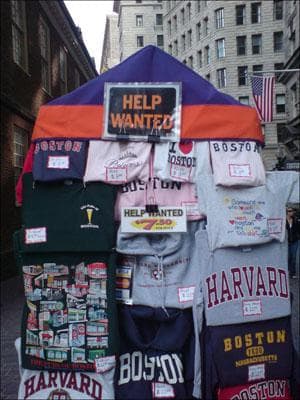Advertisement
'Underemployment' Lurks In New Mass. Jobless Numbers
ResumeThe Massachusetts unemployment rate fell last month for the first time in nearly 2 1/2 years. The rate dropped from from 9.3 percent in September to 8.9 percent in October.
But beneath the positive jobs news lurks a very troubling figure that is not getting better: the number of the underemployed. Those are people who are working part-time, only because they can’t find full-time work.

There are 200,000 people across the state who are underemployed. They're mainly people who’ve lost their full-time jobs. They might have gotten some fill-in, contract work at the same company, or they've found part-time work somewhere else –- often a job that’s below their skill levels, but they’re taking what they can get.
These underemployed people tend to only earn about 40 percent of what they were making before, which hurts the state economy and sales tax revenues when a couple hundred thousand people out there have far less money spend.
But what really bothers economists is the career stunting that can take place, since part-time workers don’t get the benefits that full-time workers do. Andrew Sum, who heads the Center for Labor Market Studies at Northeastern University, says that part time workers also don’t get the training that full-time workers do, either.
"So you're not only losing today," Sum says, "but the work that you're doing today will not pay off for you in the future. So you're going to have a negative effect on you further on down the line."
Underemployment can affect the next full-time job you can land. And it can affect how much you make when you get that job. And depending, those hits you take can stay with you for the rest of your life.
"The key thing is whether you manage to get back a job that utilized your old skills," Sum says. "If you do, you'll be fine. If not, then you're gonna be hurting."
Now this does not go to say that it will hurt less to collect unemployment benefits instead of being underemployed. Even if the economy is slow, it's moving forward. When you're working part-time, at least you're trying to keep pace. This is especially important for younger workers who are gaining initial job experience.
"Any job is better than no job for all of those young people," Northeastern's Sum says. "It's just that for adults, the disadvantages of being trapped in that part-time work are really a lot larger than just the short-term effect on hours."
And the longer the recession goes on, the harder it is for people working part-time to connect with full-time jobs and get their skills back up to speed again.
Underemployed workers say they often feel frustrated, but the level of frustration really depends on the job they used to have. One person I spoke with used to have a good paying job in manufacturing. He’s now working part-time in retail for a lot less. He's afraid his old job is not coming back. And so he's got the sobering challenge of having to find something new, take on serious training or get an education.
On the other hand, a woman I spoke with lost her job in financial services. She's now doing part-time project management work in education. She's an example of someone who has a better chance of pulling out of underemployment when the downturn ends. Luckily, says Northeastern University economist Alan Clayton-Matthews, Massachusetts is somewhat less susceptible to the dangers of underemployment.
"Because our labor force is highly educated and highly skilled, it also means it's more flexible," Clayton-Matthews says. "Many workers who transition into one type of job into another can do that fairly quickly with minimal additional training. And with minimal time lost out of the labor market."
But there's still going to be lost time. Here's the troubling side of the jobless numbers that came out Thursday. Normally, when more jobs are available, underemployed workers benefit first. They get more hours sooner, and they're better positioned to take on full-time jobs. But unemployment did not drop at all in Massachusetts' October jobs numbers.
In fact, the figure appears to be at its highest since the Great Depression. So most Commonwealth economists still think it's going to be that later next year before the underemployed get a chance to move forward with full-time jobs and careers again.
This program aired on November 20, 2009.
